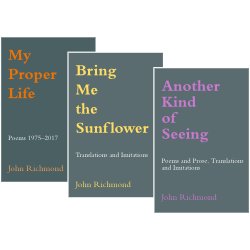First there were only voices, and the use of memory.
Then paintings on cave walls. Later,
when cities grew by rivers, and the merchants needed
something more permanent than simple trust,
pictures in miniature were proofs of contract.
So history began in the making of marks,
the blunt reed impressing the raw clay;
deliberation in the rows and columns of dark shapes
staining the pale ground of a scroll, a codex, book;
the chisel on the stele lauding the mighty.
Printing loosened, not the scribe’s grip on the pen,
but the scribe’s master’s grip on his domain.
Yet for centuries more, the living,
looking back towards the country of the dead,
had meagre clues only as to its inhabitants:
writings, images, monuments.
Now, in a blink of time,
we have the means to tell all to the future.
Five hundred years from now, historians
and citizens in search of entertainment
will replay our every move — our working, sporting, mating,
killing one another — perfectly in focus, to the life,
our accents visiting their ears like ancient music.
There will be too much history for those remote spectators.
Glutted with information, they will turn away
from their exquisite screens, to seek relief
in that day’s small events and unobserved routines.
Listen to this poem — read by Peter Hetherington



